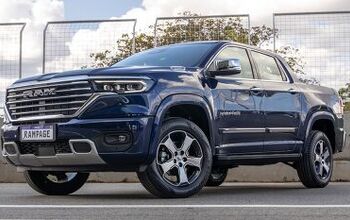Battery Tech - Not Better Range - Is Why We Should Be Excited About Chevrolet Volt

Chevrolet announced Tuesday that its new 2016 Volt would extend its all-electric range from 38 miles to 53 miles, which is a 40-percent improvement and would satisfy more than 90 percent of normal drives.
The feat itself would put the Volt on par with many all-electric commuters, whose normal range is anywhere from 60 to 90 miles. Of course, the Volt packs with it a 1.5-liter turbocharged four cylinder that bumps that range up to more than 400 miles, but that’s neither here nor there.
Let’s talk about the batteries.
On paper, the Volt’s new battery capacity is 18.4 kWh compared to last generation’s 16.5 kWh — an only 11 percent increase in capacity. Even further, there’s 96 fewer cells in the 2016 Volt compared to the current model and the batteries themselves are 20 pounds lighter.
So where does the 40-percent bump in range come from? Better batteries and a better approach.
Chevrolet has steadily improved its batteries in the Volt since the car came out in 2011 — 16 kWh to 16.5 kWh — but the bump to 18.4 kWh would be the largest improvement in six years to overall storage. Chevrolet has put the car on a diet, too, and that signals a change for the automaker from previous years.
The overall weight of the 2016 Chevrolet Volt is down 250 pounds over the current car (3,543 pounds vs. 3,781 pounds) and 100 pounds of that alone comes from slimmer energy storage.
All the little things — plus big improvements in battery tech — have equaled a 38-percent increase in EV range in six years and the car still costs $33,995, which is only $453 more than the average new car price in the United States. Range wars may become the new horsepower wars.
Almost two years ago, GM announced it was tripling its investment in its battery labs. It appears that investment is starting to pay off.

More by Aaron Cole
Latest Car Reviews
Read moreLatest Product Reviews
Read moreRecent Comments
- Yuda I'd love to see what Hennessy does with this one GAWD
- Lorenzo I just noticed the 1954 Ford Customline V8 has the same exterior dimensions, but better legroom, shoulder room, hip room, a V8 engine, and a trunk lid. It sold, with Fordomatic, for $21,500, inflation adjusted.
- Lorenzo They won't be sold just in Beverly Hills - there's a Nieman-Marcus in nearly every big city. When they're finally junked, the transfer case will be first to be salvaged, since it'll be unused.
- Ltcmgm78 Just what we need to do: add more EVs that require a charging station! We own a Volt. We charge at home. We bought the Volt off-lease. We're retired and can do all our daily errands without burning any gasoline. For us this works, but we no longer have a work commute.
- Michael S6 Given the choice between the Hornet R/T and the Alfa, I'd pick an Uber.


































Comments
Join the conversation
CORRECTION: The current (2015) battery in the Chevy Volt is 17.1 kWh. It started as 16.0 kWh in 2011, went up to 16.5 kWh for 2013, and was further bumped up to 17.1 kWh for 2015. However, GM decided against EPA range recertification with the new battery for two reasons: 1) it was likely not worth the recertification cost for a 4-5 mile gain in EPA EV range, particularly for a last model year. 2) With the new model in the pipeline, GM stands to benefit from the outgoing model having as low a range as possible, so they can tout how amazingly improved the range is - helping to fuel articles such as this one. All in, it's actually a good call on GM's part, and owners of 2015 models have been very pleased with their unadvertised range bump.
Thanks for this article - it's nice to see some err... 'positive' news from GM, and I look forward to updates. I still might go a little bit nuts and get a Volt (the economics don't really work for me); I just would love the (ER)EV experience before I leave this mortal coil...